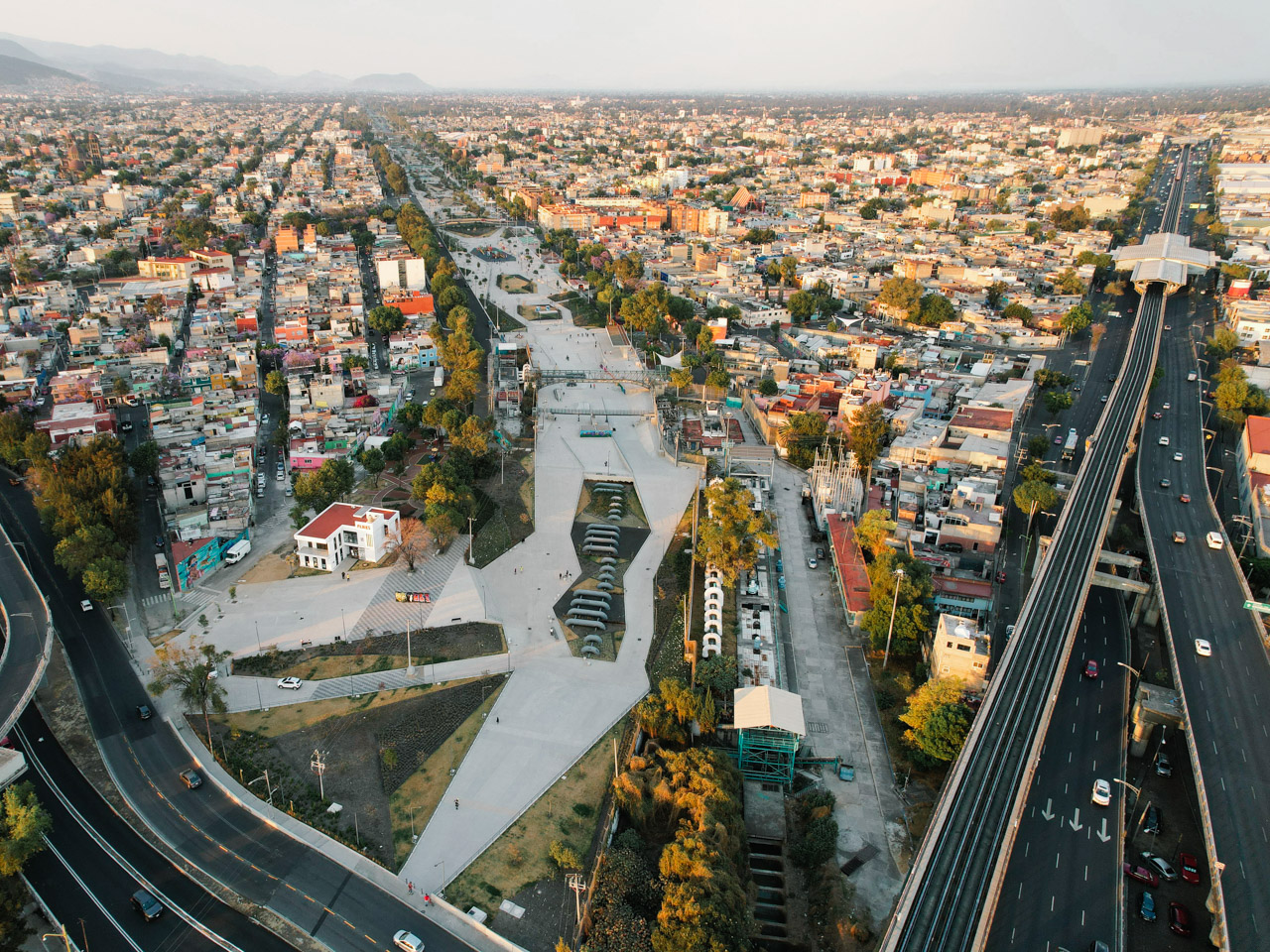2024 Prize Laureate — Mexico City
Mexico City is awarded the 2024 Prize for its outstanding commitment in uplifting the lives of citizens through innovative and sustainable urban initiatives, especially for the less privileged.1
 An aerial view showing Parque Lineal Gran Canal (on the left) and a metro station (on the right) in Mexico City © Mexico City government
An aerial view showing Parque Lineal Gran Canal (on the left) and a metro station (on the right) in Mexico City © Mexico City government
MEXICO CITY is recognised for its outstanding commitment in uplifting the lives of citizens through innovative and sustainable urban initiatives, especially for the less privileged. In navigating the challenges of a metropolis of nine million residents and a transient population of six million traveling from outside the city for work and other purposes, Mexico City’s successive leadership stands out for its visionary approach, effectively tackling pressing issues on the ground with passion and dedication. The successful implementation of transformative initiatives within a short period of time reflects not only the city’s capability to kickstart new initiatives, but also the commitment to see through their completion quickly. This showcases the city’s remarkable ability to convert challenges into an exemplary model for urban development.
Citizen-centric urban and digital agenda
Mexico City’s success is rooted in its commitment to addressing the needs of all residents, regardless of their socio-economic status. The city’s inclusive policies are manifested through a series of social programmes, ranging from free education for children and youth, to dignified ageing for the elderly. In particular, the PILARES programme (Puntos de Innovación, Libertad, Arte, Educación y Saberes’ or Points of Innovation, Freedom, Art, Education and Knowledge) is a highly-effective and well-utilised solution for providing a safety net for marginalised citizens. With 294 community centres established citywide within a five-year period, PILARES offers social programmes to foster community bonding, organises courses for continuing education, supports the police’s youth rehabilitation efforts, and helps vulnerable groups obtain useful life skills for employment.
ADIP (Agencia Digital de Innovación Pública) is a new department that leverages digital technology to drive innovation to improve public service and reach, public participation, and productivity. The results have been extraordinary. From 2019 to 2023, the agency simplified 2,100 government transactions to 500, halved the response time, and moved 70 percent of transactions online. This is supplemented by the provision of free Wi-Fi infrastructure and coding schools to help low-income families and at-risk youths acquire useful skills.
Improving accessibility and public safety
Mexico City’s willingness to experiment in the face of complex challenges has yielded innovative solutions. For example, Biblioteca Vasconcelos is a public library that allows everyone access to culture, complemented with high-quality spaces in the marginalised Buena Vista neighbourhood. Parque Lineal Gran Canal is a linear park that showcases the city’s commitment to transforming degraded areas into safe and vibrant public spaces. Moreover, Mexico City’s proactive stance towards learning from international communities and making difficult policy change – a key shift being the transformation of police operations that included partnership with the community. This resulted in a successful public security strategy that significatly reduced its homicide rates.
Mexico City is highly commendable in integrating diverse transportation modes to serve both its resident and transient populations. The city introduced a new integrated transport card to consolidate services from multiple transport providers and provide seamless access to options like the Metro, Metrobús Bus Rapid Transit, Trolleybus, and Cablebús cable car. The world’s longest cable car line in Iztapalapa is particularly impactful, by reducing travel time significantly at a low cost for the low-income neighbourhood it serves. Furthermore, the city’s extensive bike share programmes and dedicated lanes underscore its commitment to affordable and sustainable transportation.
Involving residents in transformational efforts
Mexico City ensures meaningful, inclusive participation by creatively engaging its disadvantaged citizens in environmental strategies. To illustrate, it employs about a thousand women as ‘pollinators’ under its re-vegetation efforts, which have transformed 1,500 hectares of desolate land into parks and urban forests. Residents also receive training to become installers for the city’s rainwater harvesting system, prioritised for the most marginalised areas. With 4,000 on-the-ground staff to reach residents with limited access to resources, Mexico City ensures that its initiatives positively impact its citizens’ lives.
Mexico City’s commitment to inclusivity and sustainable transformation is a deeply inspiring story for other cities, especially those with rampant growth and significant marginalised communities. Its strategies demonstrate that significant results can be achieved within a short period of time with focus and determination. While Mexico City may continue to face many social, economic, environmental, and political challenges as a growing mega city, sustained efforts guided by a long-term vision and plan to continuously improve the quality of life of all its residents can help the city continue its positive trajectory to become a model of urban innovation and inclusivity for other cities. O
Commemorative video
Case studies
| 01 | Free Wi-Fi, Llave CDMX & Procedures Digitiser A digital transformation that focuses on vulnerable communities, leveraging technology to promote inclusion, improve services, and enhance efficiency. |
| 02 | Integrated Transport Solutions A mobility transformation integrating cable cars, metro enhancements, and bike-sharing, along with a unified transport card for seamless access. |
-
All information correct as of 2023. ↩

